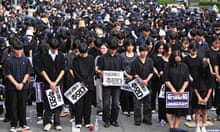When Jin from the superstar boyband BTS released Super Tuna – an upbeat song about his favourite pastime, fishing – it instantly went viral.
The track, written to commemorate the star’s birthday, has logged more than 53m YouTube views since December, and on TikTok the #SuperTuna hashtag has inspired a viral dance challenge.
With the popularity of groups such as BTS and the girl group Blackpink, which have international fanbases that number in the tens of millions, K-pop dominates pop culture far beyond its South Korean homeland. As the significance of the industry intensifies, so too does the importance of the teams that power K-pop – the creators behind every act responsible for music, fashion, choreography and more.
Bumzu is among them. The 30-year-old solo artist turned songwriter-producer, who co-produced Super Tuna, has emerged as one of the industry’s most influential people in K-pop. Seventeen, his biggest act, has sold more than 10m albums in South Korea and had four No 1 hits on Billboard’s World Albums chart. Bumzu has also worked on tracks for other big names including Nu’est, Shinee, Rain and 2PM.

“Frankly, I feel a lot of pressure. There are many times when that pressure gnaws away at me. But it’s also true that this feeling drives me to become stronger again,” said Bumzu, whose real name is Kye Beom-joo.
K-pop forms part of a multibillion-dollar industry that has become one of South Korea’s most valuable cultural products, with the country’s content industry exporting a record $11.92bn in 2020. The popularity of K-pop continues to grow amid the rise of the Korean Wave, which also includes film, TV, food and beauty. On top of being a cultural phenomenon, it has also emerged as an important source of political soft power for South Korea – and one of fanbased activism in support of causes ranging from climate action to human rights.
Yet even Bumzu struggles to pinpoint the reasons for K-pop’s global appeal. “It’s like asking why barbecue is so delicious and being told it’s because there’s meat,” Bumzu jokes.
“I don’t think we can define K-pop by just a few factors. We just make music that moves the heart.”
From musical prodigy to producer
Bumzu grew up in Seoul, surrounded by music. A talented child violinist, he was already thinking up tunes and lyrics in his head at the age of five.
His older brother was passionate about music and filled the house with equipment, which left a lasting impression on Bumzu. He wasn’t allowed to touch anything for fear he would break it, so he began working part-time jobs and saving money to buy his own equipment. He explored music production using computer software, not too far removed from the techniques he uses today.
Bumzu was fascinated with visual kei – a mixture of glam rock, metal and punk popular in Japan since the 80s. Later he fell in love with hip-hop, making beats and singing over them, and also R&B, listening to Boyz II Men and Brian McKnight on a loop.
By high school, he was determined to become a musician. In Seoul’s hip university district of Hongdae, he became active in the underground music scene.
“At the time, we called it underground. Most of the people who made music there are now creating what the public calls K-hip-hop. It’s no longer underground,” he says.

Bumzu’s career as a singer took off after competing in the television talent show Superstar K in 2012. Despite not making it to the end, he gained popularity and released his first EP a year later.
He joined Pledis Entertainment – an agency recently acquired by the parent company of Big Hit Music, which is behind BTS – and began working as a vocal coach for a group of young trainees who later became Seventeen. Bumzu was responsible for Seventeen’s first hit, Adore U, about a teenage boy’s innocent love confession.
“As I composed the song, I thought that this would be the perfect debut single for a group,” Bumzu says. “It helped me develop and refine my style.”
‘Nobody can accomplish everything or shine alone’
Most of Bumzu’s day is spent writing songs for artists, working in the studio and attending meetings. There are few breaks. He is constantly interacting with other producers, artists and label representatives.
“We live in an era of collaboration and open communication, and nobody can accomplish everything or shine alone. I have a team to strengthen my expertise, and I always consult professionals in other areas,” he says.

One of the most important parts of Bumzu’s job is to give each act a unique sound. “Every band, every artist, has their own style, direction or goal,” he says. “The most important topic we worry about every day is the unique flair, the colour of this artist, this team.”
With Seventeen, Bumzu works closest with band member, close friend and gym buddy Woozi, who co-writes and co-produces many of the group’s discography.
“He’s a very talented artist and songwriter,” Bumzu says. “We share ideas, discuss a lot and complement each other’s techniques.
“I once asked Seventeen member Hoshi to think of the choreography first. We then worked on the rhythm from it and then the melody after that. I don’t have a fixed order.”
Bumzu says the composition of a song starts and ends with inspiration, which can come from anything. “There are times when I make track ideas and melodies in my head while holding dumbbells at the gym,” he says.

“I feel like I’m in the same boat with the singers I produce for. We know that teamwork is important and everyone tries to go in one direction. If I row the opposite way, we can’t sail where we want to go. Even a small paddle can have a big impact.”










